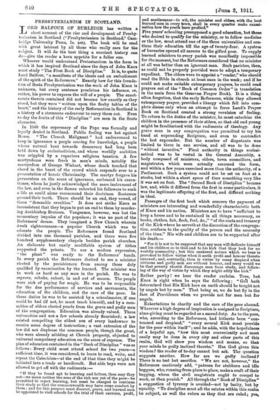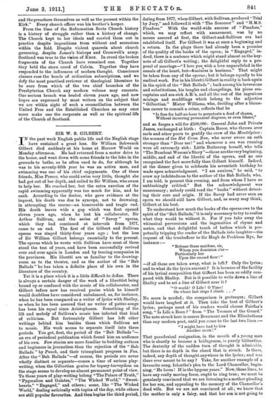PRESBYTERIANISM IN SCOTLAND.
LORD BALFOUR OF BURLEIGH has written a short account of the rise and development of Presby- terianism in Scotland (" Presbyterianism in Scotland," Cam- bridge University Press, is. net). The book will be read with great interest by all those who really care for the subject. It will do the best thing a succinct history can do—give the reader a keen appetite for a fuller one.
Whoever would understand Protestantism in the form in which it has inspired Scotland since the days of John Knox must study "The First Book of Discipline." It is, to quote Lord Balfour, "a manifesto of the ideals and an embodiment of the spirit of the Reformers." Exactly how far this founda- fon of Scots Presbyterianism was the work of John Knox is unknown, but every sentence proclaims his influence, or, rather, his power to express the will of a people. The enact- ments therein contained did not become law exactly as they stood, but they were "written upon the fleshy tables of the heart," and the history of the early Reformation in Scotland is a history of a strenuous endeavour to carry them out. Even to-day the fruits of this " Discipline " are seen in the Scots character.
In 1560 the supremacy of the Pope was formally and legally denied in Scotland. Public feeling was hot against Rome. "The Church Malignant" had endeavoured to keep in ignorance a people craving for knowledge, a people whose natural bent towards democracy had long been held down by ecclesiasticism, and whose worldly ambition was crippled by a rapacious religious taxation. A few martyrdoms were fresh in men's minds, notably the martyrdom of George Wishart, whose death touched that chord in the heart of the crowd which responds ever to a presentation of heroic Christianity. The martyr forgave his persecutors on the score of ignorance, embraced his execu- tioner, whom he justly acknowledged the mere instrument of the law, and even in the flames exhorted his followers to such a life as could alone recommend their doctrines. Scotsmen ground their teeth. There should be an end, they vowed, of these "damnable cruelties." It does not strike Knox as inconsistent that they began to put an end to them by murder- ing Archbishop Beatoun. Vengeance, however, was but the momentary impulse of the populace; it was no part of the Reformers' dream. They imagined a New Church wherein dwelt righteousness—a popular Church which was to educate the people. The Reformers found Scotland divided into one thousand parishes, and there were five hundred supplementary chapels besides parish churches. An elaborate but easily modifiable system of tithes supported the priests. To use a modern expression, "the plant" was ready to the Reformers' hands. In every parish the Reformers desired to see a minister elected by the parishioners from among those duly qualified by examination by the learned. The minister was to work as hard as any man in the parish. He was to reprove, rebuke, exhort, in and out of season. The people were sick of paying for magic. He was to be responsible for the due performance of services and sacraments, the education of the children, and the care of the poor. In these duties he was to be assisted by a schoolmaster, if one could be bad (if not, he must teach himself), and by a com- mittee of elders elected yearly from the grave and godly men of the congregation. Education was already valued. Three universities and not a few schools already flourished ; a law existed compelling the eldest son of every landowner to receive some degree of instruction ; a vast extension of the law did not displease the common people, though the great, who were already nibbling at Church property, objected to universal compulsory education on the score of expense. The plan of education contained in the "Book of Discipline" was as follows : Every child must attend school for two years—a sufficient time, it was considered, to learn to read, write, and repeat the Catechism—at the end of that time they might be initiated into a trade or handicraft. But able boys were not allowed to get off with the rudiments :—
" If they be found apt to learning and letters, then may they not—we mean neither the sons of the rich nor yet of the poor—be permitted to reject learning, but must be charged to continue their study so that the commonwealth may have some comfort by them ; and for this purpose must discreet, grave, and learned men be appointed to visit schools for the trial of their exercise, profit,
and continuance—to wit,-the minister and elders, with the best learned men in every town, shall in every quarter make exami- nation how the youth have profited.'
Five years' schooling presupposed a good education, but those
who desired to qualify for the ministry, or to follow medicine or the law, must attend one of the three universities and con- tinue their education till the age of twenty-four. A system of bursaries opened all careers to the gifted poor. To supply learned ministers to every parish was manifestly impossible for the moment, but the Reformers considered that no minister
at all was better than an ignorant man. Such parishes, then, as could not be properly provided were to adopt a temporary expedient. The elders were to appoint a "reader," who should read the Bible in church at least once in the week ; and if he could not make suitable extemporary prayers, he could read prayers out of the "Book of Common Order" (a translation
in the main from the Genevan Prayer Book). It is a thing often forgotten, that the early Reformers, while they allowed extemporary prayer, provided a liturgy which fell into com- plete disuse only when an attempt to force Land's Prayer Book on Scotland created a strong revulsion of feeling. To return to the duties of the minister, he must catechize the
children in the presence of their elders, so that old and young might be familiarized with the rudiments of theology. Any grave man in any congregation was permitted to try his hand at expounding Scripture, and even to contradict the last expounder. But the number of disputants was limited to three in one service, and all was to be done "without invective." Final authority in things ecclesi- astical was to be vested in the General Assembly, a body composed of ministers, elders, town councillors, and magistrates, which soon actually assumed the form, and within a few years exercised more than the authority, of a Parliament. Such a system could not be set on foot at a stroke, but within a short space of time something very like it was set on foot. The "Second Book of Discipline" became law, and, while it differed from the first in some particulars, it was the legitimate offspring of the first, and differed nothing in ideal.
Passages of the first book which concern the payment of ministers are interesting and wonderfully characteristic both of Knox and his nation. Ministers are to have "sufficient to keep a house and to be sustained in all things necessary, as
books, clothes, fish, flesh, fuel, Stc.," "of the rents and treasury of the Kirk where he serveth at the discretion of the congrega-
tion, conform to the quality of the person and the necessity of the time." His wife and children are to be supported after his death:—
" For it is not to be supposed that any man will dedicate himself and his children so to God and to his kirk that they look for no worldly commodity ; but this cankered nature which we bear is provoked to follow virtue when it seeth profit and honour thereto annexed; and, contrarily, then is virtue by many despised when virtuous and godly men are without honour, and sorry would we be that poverty should discourage men from study, and follow- ing of the way of virtue by which they might edify the kirk."
Rather pawky ! we hear the reader exclaim. True, but Knox is right when he says the following : "Go' bath determined that His Kirk here on earth should be taught not by angels but by men." That being so, we do but fly in the face of Providence when we provide not for men but for angels.
Exhortations to charity and the care of the poor abound. Wherever a high degree of inspiration is assigned to Scripture, alms-giving must be regarded as a sacred duty. As to the poor, who, according to the Reformers, had hitherto been "cons temned and despised," "every several Kirk must provide for the poor within itself " ; and he adds, with the hopefulness of a hopeful age, "how this most conveniently and most easily may be done in every city and other parts of this realm, God will show you wisdom and means, so that your minds be godly inclined thereto." Has God given this wisdom ? the reader of to-day cannot but ask. The question suggests another. How far are we godly inclined ? There is no test but sacrifice. "We are not, however," the Reformers cautiously add, "patrons for stubborn and idle beggars, who, running from place to place, make a craft of their begging, whom the civil magistrate ought to compel to work, or tben punish." All through the" Book of Discipline" a suggestion of tyranny is avoided—not by laxity, but by equality. "To discipline must all the estates within this realm be subject, as well the rulers as they that are ruled ; yea, and the preachers themselves as well as the poorest within the Kirk." Every church officer was his brother's keeper.
From the time of the Reformation Scots Church history is a history of struggle rather than a history of change. The Church kept to her ideals and carried them out in practice despite impositions from without and secessions within the fold. Despite violent quarrels about church governing, despite James's bishops and Oromwell's army. Scotland was true to the vision of Knox. In creed the broken fragments of the Church have remained one. Together they held the stern creed of Calvin. Together they have responded to the influences of modern thought. Conscience clauses ease the bonds of ordination subscriptions, and we defy the most practised reviewer of theological literature to be sure from which of the two chief branchei of the Presbyterian Church any modern volume may emanate. One serious breach was healed eleven years ago, and now hopes are expressed by most writers on the subject that we are within sight of such a reconciliation between the United Free and the Established Churches as may once more make one the corporate as well as the spiritual life of the Church of Scotland.







































 Previous page
Previous page